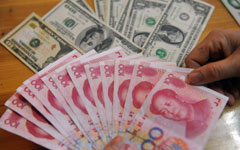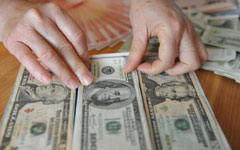Appreciate the yuan depreciation
By Xu Qiyuan (China Daily) Updated: 2014-04-28 06:35International capital invested in China with a high leverage faces the prospect of a decline in yields and rising investment risks. These factors also hampered short-term capital inflows.
China's international payment imbalances are also further approaching equilibrium. In recent years, international net capital inflows and net outflows appear staggered, and the current account surplus has narrowed.
 |
 |
Taking into account all of these factors, it is clear that February's exports and the current account balance are still weak. From the perspective of the fundamentals of international payments, the yuan exchange rate has been relatively close to equilibrium.
For these reasons, it is unlikely that yuan will continue to lose its value over time. Moreover, after the People's Bank of China announced the expansion of yuan exchange rate volatility on March 15, the depreciation rate was expected to soar. However, the current rate is still modest, and a sharp depreciation of the currency exchange rate will not happen in China, as in some other emerging economies, because it is still within controllable means.
This is also because since the 2008 global financial crisis, short-term international capital inflows into China have been limited, while in countries such as Turkey, Mexico, and South Africa, net short-term capital inflows since the crisis have accounted for almost all of its foreign exchange reserves. In others countries such as India and Brazil it was nearly 50 percent. Though China's capital account has limited access, it has a huge pile of foreign exchange reserves. This mitigates the possibility of sharp exchange rate depreciation in China. Devaluation of the yuan will also help alleviate pressure on China's exports.
Since the second half of last year, most of the currencies in the emerging nations have depreciated against the US dollar. The yuan's depreciation against the dollar by 3 percent does not provide a strong impetus to fuel further growth in exports. Therefore, enhancing the competitiveness of enterprises should be the main focus at this stage.
- China's Zhongjin Gold Q1 profits dive
- Profit of China's largest coal producer falls 9.9%
- Big data reveals trend of Chinese auto market
- Profits of China Minsheng Bank surge in Q1
- Advertisers race to win loyalty of fans
- Podium position for sporting goods
- Chengdu Diao brings TCM cures to world
- Inside China's most exclusive business club
















